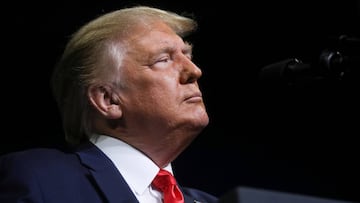Why does the Supreme Court say Trump is not immune?
The United States Supreme Court threw out President Trump's argument that he does not have to hand over tax returns and financial records to New York prosecutors.


The Supreme Court of the United States of America has held that President Donald Trump does not have complete immunity from criminal investigation. In a 7-2 ruling, the Court sided with New York prosecutors who are seeking several years of tax returns as part of an investigation into alleged hush-money payments to two women who say they had affairs with Trump.
The President’s lawyers had argued he did not have to comply with subpoenas for the records, but the Supreme Court rejected that argument. In the majority opinion, written by Chief Justice Roberts, the Court held, "Two hundred years ago, a great jurist of our Court established that no citizen, not even the President, is categorically above the common duty to produce evidence when called upon in a criminal proceeding. We reaffirm that principle today."
However, the decision sends the case back down to the lower courts, where a final decision will be made as to whether Trump has to turn over any documents. The President’s attorney, Jay Sekulow, said Trump would continue to challenge efforts to get his financial records in the lower courts.
"We are pleased that in the decisions issued today, the Supreme Court has temporarily blocked both Congress and New York prosecutors from obtaining the president's financial records," Sekulow said. "We will now proceed to raise additional Constitutional and legal issues in the lower courts."
Manhattan District Attorney Cyrus Vance Jr., who is seeking the information, was upbeat, calling the decision “a tremendous victory for our nation's system of justice and its founding principle that no one — not even a president — is above the law."
Vance said his investigation would resume, “guided as always by the grand jury's solemn obligation to follow the law and the facts, wherever they may lead.”
Possibility of public release of President Trump's tax returns
Those hoping for President Trump's tax returns and financial records to be released before the November Presidential election are, however likely to be disappointed, for a number of reasons.
Firstly, as noted above, Trump's lawyers are now going to raise a number of arguments and objections in the lower court in a bid to prevent the records being turned over. This process is likely to take sufficient time that the matter is unlikely to be concluded prior to the election.
Secondly, even where Trump was forced to hand over the records, grand jury secrecy rules would likely mean Trump's tax returns would not become public, even if handed over to the District Attorney, unless charges are filed against current or former employees of Trump. Disclosure, even in that situation, would likely be limited.
While Trump reacted angrily to the ruling, tweeting that he was suffering from political prosecution, the reality is that today's judgement is a political win for him, as the chances of his tax returns being made public has likely gone down, and even where they are it will be some time off in the future.
What do US Presidents have immunity from?
The US Justice Department has a long-standing policy that a sitting Presidents of the United States cannot be indicted on criminal charges, although the US Constitution itself is silent on the matter and the Supreme Court has never directly addressed the question.
The Justice Deparment’s policy was set out in 1973 by its Office of Legal Counsel in an internal memo in the midst of the Watergate Scandal around President Richard Nixon. “The spectacle of an indicted president still trying to serve as Chief Executive boggles the imagination,” read the memo. The stance was reaffirmed in 2000, in a memo that said a sitting president is “constitutionally immune” from indictment and prosecution, because it would violate the separation of powers set out in the constitution.
In the case at hand over his tax returns Trump’s lawyers had attempted to argue that this immunity from prosecution meant the president could not be subpoenaed in a criminal investigation. However the Supreme Court made it clear that immunity from prosecution did not extend to immunity from involvement in criminal proceedings and the requirement to produce evidence demanded by a court.
Under the US legal system, explains the Court's ruling in the present case, “the public has a right to every man's evidence. Since the earliest days of the Republic, 'every man' has included the president of the United States. Beginning with Jefferson and carrying on through Clinton, presidents have uniformly testified or produced documents in criminal proceedings when called upon by federal courts."
Supreme Court rules information does not have to be shared with Congress
In a related case, also decided today, the Supreme Court held that Trump's tax records and financial information do not have to be shared with Congress.
Two Democrat-controlled committees of the House of Representatives have also demanded access to Trump's tax returns, arguing they are necessary to determine if current conflict-of-interest laws on a US president are working properly.
The Supreme Court, again with a 7-2 ruling, send the case back to the lower court, which had held that Congress could have access, saying it was necessary to better balance presidential privileges with the powers of law makers. The Supreme Court said that in issuing the subpoenas lawmakers had failed to properly take into account the importance of separation of powers.
“When Congress seeks information ‘needed for intelligent legislative action,’ it ‘unquestionably’ remains ‘the duty of all citizens to cooperate,’” Chief Justice Roberts wrote in the majority decision. “Congressional subpoenas for information from the President, however, implicate special concerns regarding the separation of powers. The courts below did not take adequate account of those concerns.”
Related stories
The lower court will now need to reassess their position, with no new decision expected in the near term. The House of Representatives Speaker, Democrat Nancy Pelosi, said they will continue to press their case in the lower courts, saying "Congress will continue to conduct oversight for the people."
Trump refusing to release tax returns
President Donald Trump is the first president since Richard Nixon not to have publicly released his tax returns. He has consistently argued that he cannot do so as he is under audit by the Internal Revenue Service (IRS). However, the IRS have said he is entirely free to do so voluntarily. Trump refuses to address that question in his denials to release his returns.
The New York Times has obtained parts of some of Trump's tax return, saying they show that in the early 1990s he used a scheme to avoid paying taxes. The newspaper also reported that Trump's company had a tendency to undervalue properties in order to reduce tax bills.
The White House is sticking with the ‘Trump is under audit’ excuse for not releasing his tax returns.
— NowThis (@nowthisnews) July 9, 2020
Reminder: An audit would not prevent him from releasing his tax returns. pic.twitter.com/OsiJ5YqXwE